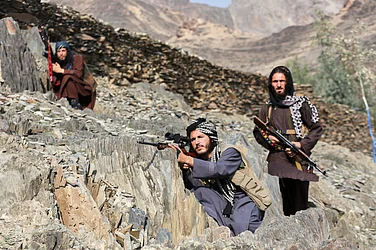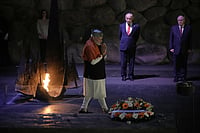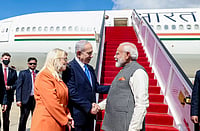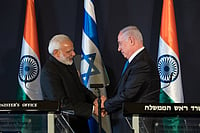External Affairs Minister Subramanyam Jaishankar is in Beijing for the Shanghai Cooperation Organisation (SCO) foreign ministers meeting, marking his first trip to China since the 2020 Galwan clash that severely strained bilateral ties. But the visit comes amid growing unease in New Delhi over Beijing’s backing of Pakistan during India’s recent Operation Sindoor, underscoring the complex ties between the two Asian neighbours and the undercurrents of mistrust that have persisted since the border skirmish of 1962.
On Monday evening, during a meeting with China’s foreign minister Wang Yi, Jaishankar struck a warm and conciliatory tone, calling for a revival of normal bilateral engagement. He said the two sides should resume the habit of visiting each other’s countries. "In recent times, the two of us have had several opportunities to meet at international events and carry out strategic communication. It is our expectation that this will now be regular and take place in each other’s countries." This seems like a clear signal that India wants to restore diplomatic momentum and get back to the period before the military confrontation in Galwan.
Earlier in the morning, Jaishankar had a bilateral meeting with Chinese Vice President Han Zheng, where both sides emphasised the need to reset troubled relations.
Jaishankar noted that relations with China "has been steadily improving since the meeting between Prime Minister Modi and President Xi Jinping in Kazan last October. I am confident that my discussions in this visit will maintain that positive trajectory," the MEA read out of the meeting said.
"Continued normalisation of our ties can produce mutually beneficial outcomes,’’ the minister said. Commenting on the current complex international situation, he said, "As neighbouring nations and major economies, an open exchange of views and perspectives between India and China is very important." Jaishankar’s statement indicates that India is keen to get back relations with China on track.
Strategic Realignments Within the SCO
China is the current chair of the Shanghai Cooperation Organisation, a group that was set up in 2001 initially with six members— China, Russia, Kazakhstan, Kyrgyz Republic, Tajikistan, and Uzbekistan. In 2017, India and Pakistan joined, Iran did in 2023, and Belarus in 2024, bringing the number of member nations to ten. Many countries are waiting in the wings for membership. The SCO is a China and Russia-led initiative. The West sees this as an attempt by the SCO to break its domination of the world and its financial and security institutions. These analysts regard the SCO as a bulwark against the expansion of US influence in the Central Asian region.
India’s Dilemma
There lies the rub. India, as well as a few other countries like Kazakhstan and Uzbekistan, are open to cooperating with the US and the West as well as with China and Russia. These countries including India, with its growing relationship with the US, want to have a foot in both camps.
While India is keen to build its relations with the US, President Donald Trump’s repeated claims that he had forced a ceasefire on India and Pakistan during the Sindoor operation came as somewhat of a shock and rankled New Delhi. The President’s luncheon for visiting Pakistan army chief General Asim Munir was also disconcerting. Army chief’s at the most do a courtesy call on the President while reserving most of the visit to dealing with his counterpart in the US army as well as the Pentagon. The fact that unlike during the Biden tenure when Pakistan was more or less ignored by Washington, Trump is ready to engage with both countries, without finger pointing at Pakistan has come as an eyeopener. So it is imperative for India to continue its effort to play both camps. How long New Delhi can carry on the tight rope walk remains to be seen. It will be forced to take a call sooner or later. But for now the balancing act continues, leading to some confusion. At the BRICS summit in Brazil recently, India condemned Israel’s attack on Iran.
But at the SCO defence minister’s meet India refused to sign on the dotted line of a joint declaration on the grounds that it was not happy with the language of the communique, as there was no mention of cross-border terror.
The presence of Pakistan in the group and China’s repeated public announcements during the India-Pakistan spat that it was ready to support Islamabad in defending its `"national sovereignty and territorial integrity" reflected the close strategic and political alignment between the two countries. After the Pahalgam massacre, China like the rest of the world condemned the terror attack.
The two read-outs by the MEA on Jaishankar’s interactions in Beijing signals India’s readiness to engage with China. Whether something more substantive is in the horizon remains to be seen. Ahead of Jaishankar’s visit, both defence minister Rajnath Singh and NSA Ajit Doval visited Beijing.



























